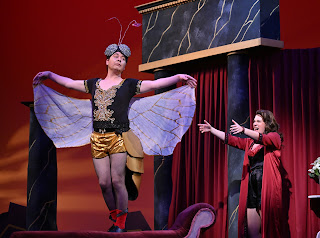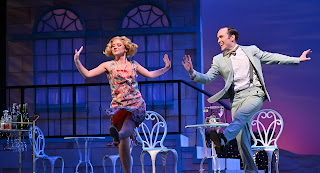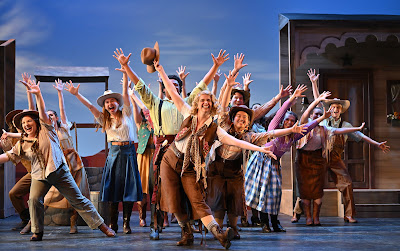By Harry Forbes
For the first time in four years, Ohio Light Opera has
returned for a full indoor season of shows (though one shy of the usual seven),
and with a full-sized company of players. After skipping 2020 because of COVID,
there were abbreviated outdoor or partially outdoor presentations during 2021
and 2022 with reduced forces.
During this time, the talent base of the repertory company
has perforce largely changed, with exceptions such as mainstay performers
Spencer Reese and Jacob Allen, but I'm happy to report that with the influx of
newcomers, the overall quality -- due, no doubt in large part to the leadership
of Artistic Director Steven Daigle -- remains undiminished. So, too, the discreet
addition of body mikes has made a welcome difference in audibility for the audience,
adding just that extra bit of oomph in the expansive Freedlander auditorium.
In addition to their accomplished onstage performances,
Reese continues to come up with terrific choreography for all the productions (as
well as directing one this season), and Allen, the company’s assistant artistic
director, directed two.
The 2023 rarities included Hungarian composer Emmerich
Kálmán’s atypical final work, “Arizona Lady,” and the original 1925 version of
Vincent Youmans and Irving Caesar and Otto Harbach’s “No, No, Nanette” which
today is better remembered for its long-running 1971 Broadway revival.
Also on the roster was “H.M.S. Pinafore,” the obligatory
Gilbert and Sullivan production (reminding us that OLO was, in fact, founded 44
years ago as a company dedicated to the British duo), Jacques Offenbach’s
“Orpheus in the Underworld,” and Broadway classics “Camelot” and “How To
Succeed In Business Without Really Trying.”

There was particular interest among some in seeing the
unadulterated, original “Camelot” to compare with director Bartlett Sher’s
recently shuttered New York revival with its radically revised book by Aaron
Sorkin. To cut to the chase, OLO’s production, faithful to the original text,
proved infinitely superior, demonstrating that Sorkin’s wholesale revisions
were in no way an improvement. Alan Jay Lerner's original script holds up just
fine, and under Daigle's sensitive direction, the show was infinitely more moving
than its big budget New York counterpart. And rather surprisingly, even the
orchestra, under OLO Music Director Michael Borowitz, sounded lusher than the
not inconsiderable 35-piece Lincoln Center orchestra. (OLO’s has about 21.)
James Mitchell, who also impressed with his well drawn tipsy
boatman John Styx in “Orpheus,” offered a beautifully acted and sung King
Arthur. Though he and the rest of the cast admirably played with English
accents (unlike the recent New York crew), Mitchell chose to eschew broad a’s.
Still, this was a fine, moving performance.
So too, Sadie Spivey’s Guenevere was sensitively acted and
her singing generated comparisons with originator Julie Andrews, while Nathan
Seldin’s Lancelot delivered “C’est Moi '' and “If Ever I Would Leave You” with
appropriate virile panache and Vincent Gover excelled as both Merlyn and
Pellinore. Matthew Reynolds made an appropriately rascally Mordred, and all the
other roles were well handled.
“Then You May Take Me to the Fair,” cut from the original
production after the cast album was recorded but thereafter not included in the
official vocal score, was not included, nor was the randy knights’ choral “Fie
on Goodness,” both of which were, in fact, reinstated at Lincoln Center. On the
other hand, Nimue’s haunting “Follow Me,” sweetly sung by Sophia Masterson, and
“The Jousts” sequence -- excluded in New York and replaced by a non-musical
sword fight -- were back in their rightful places here, and Guenevere got back
her lovely “I Loved You Once in Silence,” appropriated by Lancelot in New York.

The “Orpheus” staging utilized the late Richard Traubner’s
clever 2001 translation, newly adapted by Daigle, who also directed. This was
the original 1858 version, with none of the added music from Offenbach's 1874
greatly expanded version, not even the overture.
Tenor Jack Murphy's Orpheus was a well-sung comic delight.
Bespectacled, lanky and limber, he drove Eurydice (superbly sung by Christine
Price) to the edge of madness with his incessant fiddle playing (incidentally,
quite accurately mimed, while Reese’s choreography kept him in ceaseless
motion), driving her into the hands of a handsome cowboy who turns out to be
Pluto, king of the Underworld, played with devilish charm by Nicholas Orth who
sang his opening number from the auditorium making his way through one of the
long rows before finishing onstage with an impressive falsetto flourish.
Eventually Jupiter -- played by Vincent Gover who should get
a versatility award for all of his brilliantly enacted character roles this
season -- and the other gods from Mount Olympus visit Hades, and Jupiter
attempts to seduce Eurydice by metamorphosing into a fly. The ensuing duet
between Gover, sporting witty gold hot pants along with other wacky fly
accouterments, and Price, was a laugh riot, the best I’ve ever seen, as the
pair worked themselves into an orgasmic lather.
Bergen Price was outstanding in the sometimes tiresome role
of Public Opinion, and handled Daigle’s newly added prologue with aplomb. The
Gods were all well played and sung by, among others, Lily Graham (Diana),
Michelle Pedersen (Juno), Nathan Seldin (Mars), Tzytle Steinman (Venus), Sara
Lucille Law (Cupid), and Margaret Langhorne (Mercury).The whole was stylishly
conducted by Borowitz.

“H.M.S. Pinafore” -- performed at OLO more than any other
work (135 times) -- was, by comparison with the season’s other offerings,
fairly standard stuff but nonetheless a crowd pleaser.
OLO Associate Music Director Wilson Southerland conducted
with customary spirit. And here was Gover again, this time as Sir Joseph
Porter, KCB (which, incidentally, we learned from OLO Board Chairman Michael
Miller’s pre-show talk, stands for Knight Commander of the Order of the Bath!)
I’m not sure I cared for the comic miming that director
Reese devised for Corcoran and Buttercup’s “Things Are Seldom What They Seem.”
which, arguably, spoiled the twist at the end more than it should, not that
diehard G&S fans, who know the show by heart, would care.
Gover’s Porter, Allen’s Captain Corcoran, and Sophia
Masterson’s Josephine were all capably performed. Tzytle Steinman’s Little
Buttercup hardly fit her character’s “plump” descriptor, but her rich mezzo was
a plus. Tenor Owen Malone stepped into the role of Ralph Rackstraw for the
first time at my performance and sang with distinction.
OLO has already mounted an impressive 14 Emmerich Kálmán’s
works (more than any other company in the world). His operettas are, you might
be surprised to learn, the most performed of any operetta composer globally
thanks to frequent productions in Eastern Europe and Russia. OLO has a few more
titles to go, but they’ve finally gotten around to his last work.

“Arizona Lady '' received its premiere in early 1954 on
Bavarian radio just weeks after Kálmán’s death but was not performed on stage
till six weeks later in Bern, Switzerland. It’s a fascinating piece. In many
respects, it’s a European’s naive view of America but, in truth, Kálmán was an
enthusiastic fan of western novels and films, and the original German libretto
fashioned by his longtime collaborator Alfred Grünwald and Gustav Beer is not
dissimilar from any number of B-level western movies of the time.
As such, the general narrative is fairly absorbing, but it’s
a bit disconcerting when characters react to catastrophic events with
remarkable equanimity, and then moments later, break into cheerful song.
Kálmán endeavored to write in a fresh Broadway style, and
hearing the work in Daigle’s English translation shows the composer not far off
the mark. (Jacob Allen directed.) Kálmán couldn't resist some of his trademark
Hungarian strains, and heroine Lona’s entrance number is a close cousin of the
numbers in “Die Csárdásfürstin'' and “Gräfin Mariza.” This is explained in the
libretto by ascribing her character a partial Hungarian heritage. Thereafter,
the score sounds reasonably American, far more so than, say, Puccini’s Western-themed
“Fanciulla del West.” The “Yip-i-ay-o’s” don’t sound too forced. There are
musically thematic similarities to “Oklahoma!” particularly in the first act
“Arizona! Land Where the Cactus Bloom” number. But curiously, Kálmán’s most
immediate inspiration was apparently the less-renowned 1949 “Texas, L’il
Darlin’.”
Audience members of my performance had the added pleasure of
watching the show along with Kálmán’s daughter Yvonne Kálmán, the lady
positioned in her customary front row seat, as with past revivals there of her
father’s work.
As hero Roy Dexter, Jack Murphy, the aforementioned comic
Orpheus, was here transformed into a picture-perfect singing cowboy. He’s hired
as foreman of “no-time-for-love” ranch owner Lona Farrell (Louisa Waycott) after
she fires the last one. Ideally, I think there should have been more sense of
repressed passion between the couple, something more akin to the Mariza-Tassilo
dynamic of “Mariza” but, truthfully, the libretto doesn’t afford as much
opportunity.
Elsewhere Tzytle Steinman as Nelly and Reese as Chester
handled the lively second couple numbers amusingly. Matthew Reynolds was
another bright spot as carnival fortune teller Cavarelli (alternating between
his bogus Italian and authentic Irish accents), and Lily Graham had a lively
bit as a shady nightclub singer who attempts to frame the hero.
The orchestra under Southerland’s baton sounded full-bodied
and sumptuous, though sometimes overpowered the singers despite the
aforementioned miking.

“No, No, Nanette” was a real charmer, and for those who
remembered the 70s Broadway revival, made a fascinating comparison. Some may
recall theater historian John McGlinn’s memorable New York concert version of
the 1925 original score in 1986, but OLO’s had the advantage of being fully
staged. The Broadway revival with Ruby Keeler, Helen Gallagher, Bobby Van, Susan
Watson and Patsy Kelly had spiffy new orchestrations by Ralph Burns, but the
authentic original makes for a refreshingly different experience.
OLO’s reconstruction was based on materials at the
University of Texas in Austin, and the production was a sensible amalgam of the
Broadway and London versions, dropping the inconsequential “My Doctor” and
“Payday Pauline” from the former, and using “I’ve Confessed to the Breeze” and
“Take a Little One-Step” from the latter, as did the 1971 revival.
Daigle directed with requisite charm, Michael Borowitz at
the baton likewise had the right period flavor, while wunderkind Spencer Reese
provided miles of choreography besides playing the major role of Billy. (Borowitz
also deserves credit for creating an orchestra-readable performance edition.)
The cast was up to the challenge of OLO’s dancingist show
since the company’s 2017 “Anything Goes.” When virtually the full cast was
onstage tapping away, it made a most impressive sight. My only quibble was that
most of the dances commenced with scarcely a moment of dramatic setup. But it
was all so enjoyable, that seems a churlish complaint. The show’s evergreen
hits, “Tea for Two” and “I Want to Be Happy” were exceedingly well served.
Otto Harbach and Frank Mandel’s original book was a bit
naughtier than the cozy nostalgic slant of Burt Shevelove’s 1971 revision, and
the Vincent Youmans music (lyrics by Irving Caesar and Otto Harbach) sparkled
as ever.
Jacob Allen played Jimmy, the bible publisher with three
ladies on the (platonic) side. Bergen Price was his frugal wife Sue who, much
to Jimmy’s chagrin, resolutely refuses to spend his money. Sadie Spivey traded
Guenevere’s queenly attire for 20s flapper garb, and was equally delightful.
Julia Fedor was sharp and savvy as Billy’s wife Lucille, delivering fine
versions of “Too Many Rings Around Rosie” and “Where Has My Hubby Gone Blues.”
Alexander Spence was Nanette’s straight-laced suitor.

Frank Loesser’s 1961 Pulitzer Prize-winning “How to Succeed
in Business Without Really Trying” proved once more how well the OLO forces can
handle Golden Age Broadway material. Reese played J. Pierrepont Finch, the
ambitious window washer who schemes himself to promotion after promotion at the
World Wide Wicket Company, and the part especially showcased his excellent
vocal delivery, so often overlooked given his dancing talents. Gover made an
ideal company president, J.B. Biggley.
Louisa Waycott topped her “Arizona Lady” role with an
outstandingly sung and played Rosemary. Matthew Reynolds excelled as the
conniving Bud Frump, and Bergen Price demonstrated her versatility as the va-va-voom
secretary Hedy LaRue.
Jacob Allen directed with requisite Broadway know-how, and
Southerland was the knowing conductor.
There were a couple of special events during the week I
attended: a 1985 Hungarian biopic of Kálmán (fortunately subtitled) -- “Az életmuzsikájat - Kálmán Imre” -- which featured generous excerpts from many of his
major works. The film was based, in part, on “The Unadulterated Truth,”
Kálmán’s 1932 memoir about the early part of his life. (The book has, in fact,
just been translated by Alexander Butziger, and will soon be available for
order from the Operetta Foundation.)
And Michael Miller gave his annual Operetta Mania potpourri
of eclectic operetta videoclips from the world’s stages. On this occasion, the
items ranged from a Dutch production of Offenbach’s “Bluebeard” and the
all-female Takarazuka Kagekidan Japanese troupe in Cole Porter’s “Can-Can” to a
Morbisch “Giuditta” and Maurice Yvain’s “Là-Haut” from a 1984 Paris production.
The last named prompted the observation that OLO has actually yet to mount a
20th Century French operetta. We also got to see young Jacob Allen cavorting
through “It” from a 2008 OLO production of “The Desert Song.” All the clips were
well chosen and placed in interesting context by Miller.
There were, as well, several informative pre-performance
talks. Miller handled “Arizona Lady” and “H.M.S. Pinafore,” Reese “Camelot,”
and Allen “Orpheus in the Underworld.”
Under Daigle’s and Executive Director Laura Neill’s
leadership, Ohio Light Opera has clearly lost not a whit of its mojo, and
remains a unique bastion of musical theater and operetta.
(The Ohio
Light Opera, The College of Wooster, 1189 Beall Avenue, Wooster, OH; 330-263-2345
or ohiolightopera.org; through July 30)
Photos:
Matt Dilyard
(Top)
Tzytle Steinman & company, “Arizona Lady”
(Below)
“Camelot”
company
(l.-r.)
Gover, Christine Price, “Orpheus in the Underworld”
“H.M.S.
Pinafore” company
(l.-r.)
Murphy, Waycott, “Arizona Lady”
(l.r.)
Spivey, Reese, “No, No, Nanette”
(l.-r.)
Bergen Price, Colin Ring, Madison Barrett, “How to Succeed in Business Without
Really Trying”




















